St. Joseph's Abbey, Massachusetts
St. Joseph's Abbey is a Trappist monastery in Spencer, Massachusetts. It is known for its production and marketing of jams and jellies, which partially supports the abbey. In 2013, the abbey became the first Trappist brewery outside Europe. The monastery is also known as one of the origins of the centering prayer movement in the 1970s. The grounds of the Abbey are generally open to the public except for certain areas reserved for the monastic enclosure.[1]
 St. Joseph's Abbey | |
| Monastery information | |
|---|---|
| Order | Trappists |
| Established | 1950 |
| People | |
| Important associated figures | William Meninger Basil Pennington Thomas Keating |
| Site | |
| Location | Spencer, Massachusetts, U.S. |
| Public access | Yes |
| Other information | Produces and markets Trappist Preserves, Spencer Ale. |
History
St. Joseph’s Abbey was settled in 1950 on the former site of Alta Crest Farms, under the leadership of Dom Edmund Futterer. The Trappists that settled the abbey moved there from their previous location in Cumberland, Rhode Island, which was heavily damaged by a 1950 fire.[2]
Father Thomas Keating was elected abbot of the abbey in 1961. Keating, one of the architects of the contemplative prayer movement, retired in 1981.[3] Along with Meninger and Pennington, Keating founded the centering prayer movement in the 1970s while abbot of St. Joseph's.[4] The three held retreats at the abbey to teach this method of prayer.[4]
After the short term of Dom Pascal Skutecky, due to poor health, Dom Augustine Roberts became the fourth Abbot in June 1984 and served two six-year terms. His autobiography is Finding The Treasure: Letters From A Global Monk. The current Abbot, Damian Carr, was elected in June 1996.
Goods produced
Trappist Preserves
Trappist Preserves is a brand of fruit preserves produced and sold by the abbey. In 1954, shortly after their arrival in Spencer, a small, stove-top batch of mint jelly was made by Brother John Berchmans, one of the monks, with mint from their herb garden.[5] Since monastic austerity at that time precluded the jelly from being served to the monks at meals, it was sold at the porters' lodge. The response to the jelly encouraged the monks to try making and selling other varieties. Soon, jelly-making proved to be a successful and compatible monastic industry, contributing about half of the income needed to run the abbey.[5] The jams and jellies made by the monks are sold in supermarkets in the United States, particularly in the New England region.[2] In 2005, the monks produced 1.7 million jars of preserves in 26 flavors, turning one and a half tons of fruit into preserves daily.[5]
Spencer Brewery
Spencer Brewery is the name of the brewery run by the abbey that produces Trappist beer. In 2010, St. Joseph's Abbey explored possibility of brewing beer like other Trappist monasteries, and sent several fact finding missions — first to the Belgian Beer Fest in Boston, then to several Trappist breweries in Europe.[6] The Trappist breweries made three recommendations for the new enterprise: hire a skilled brewing engineer; build a modern, state of the art facility; and only brew a single beer for the first five years. Over twenty test batches were developed before settling on the final beer's recipe. The first beer produced was a blonde ale at 6.5% alcohol by volume which was called Spencer Trappist Ale. As of 2016, it was the first and only certified Trappist beer brewed in the United States.[7]
The brewery occupies 36,000 square feet and has a capacity of 50 barrels. It held its first open house on August 6, 2016 to 2,500 visitors.[7] Response from subsequent open houses was strong, and as of 2018 the brewery was exploring constructing a taproom that would be open year-round.[8]
The Holy Rood Guild
The monks at the abbey also make liturgical vestments under the brand of The Holy Rood Guild.[9]
References
- Ellery, J. P. (2009-04-02). "Tranquility, beauty of abbey offer respite from life's rigors". Telegram and Gazette. Worcester, MA. p. 3.
- Byrne, Kerry J. (2007-07-11). "Fast food". Boston Herald. Boston. p. 30.
- Fox, Thomas C. (2007-12-14). "Keating moved the movement". National Catholic Reporter (44.7): 19.
- Berger, Rose Marie (December 2006). "Be Still & Know: Thomas Keating talks about how the ancient church tradition of contemplation can transform Christians today". Sojourners Magazine. 35 (11): 34.
- Giuca, Linda (2005-12-21). "A Vow of Quality: Massachusetts monks use best ingredients in well-known Trappist Preserves". Bangor Daily News. Bangor, ME. p. C1. Retrieved 2011-03-13.
- "Monks near Boston will start selling the first Trappist beer brewed outside of Europe". New York Daily News. 16 January 2014. Retrieved 22 January 2014.
- Wilking, Alex (2016-08-01). "Spencer Brewery to Open to the Public for One Day Only". Boston. Retrieved 2018-08-15.
- Bartlett, Jessica (2018-08-14). "Spencer Brewery monks contemplate a tasting room". Boston Business Journal. Retrieved 2018-08-15.
- Russell, Gerard F. (2008-12-23). "Nonprofits to receive grants for power study; Abbey, health facility consider wind turbines". Telegram and Gazette. Worcester, MA. p. B1.
Further reading
- Simon, Raphael (2004). Hammer and Fire: way to contemplative happiness and mental health in accordance with the Judeo-Christian tradition. Bethesda, MD: Zaccheus Press. ISBN 978-0-9725981-2-5. OCLC 225916393.